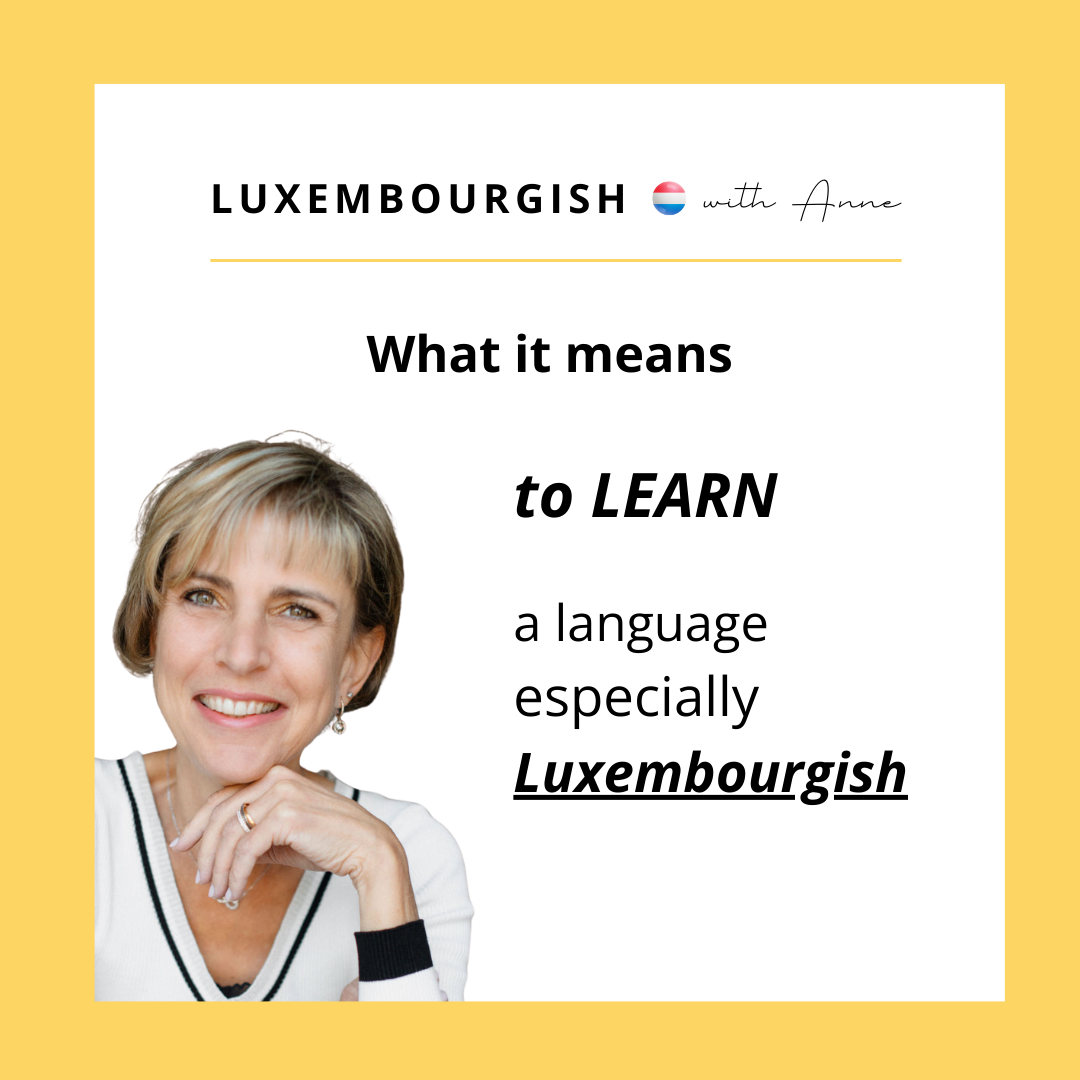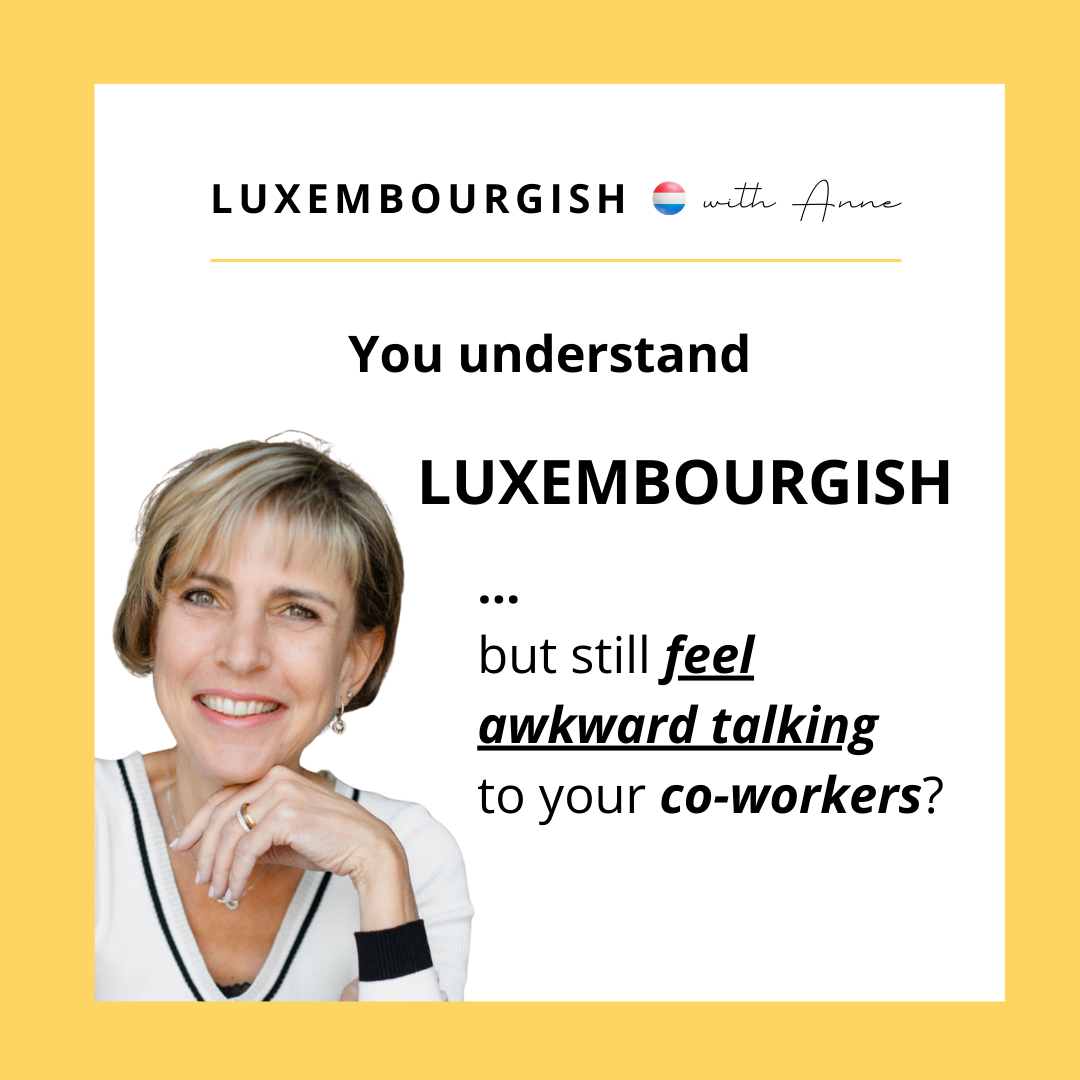Today’s topic is one of the most underrated but powerful moments for language learners: the kitchen. Or maybe the coffee machine corner. Many language learners focus on meetings and presentations—but the real magic often happens by the coffee machine.
In this lesson I explore why informal conversations in the kitchen or hallway are golden opportunities to build workplace confidence in Luxembourgish. We’ll explore:
- Key phrases to start conversations
- Mindset tips to let go of perfection
- A simple speaking challenge you can try this week
Think about your last day at work. Maybe you passed a colleague getting coffee, or you both stood waiting for the microwave. These are everyday situations. But they’re full of opportunities to connect.
Small talk isn’t small. It’s a way to say: I’m open. I’m approachable. I’m trying. In Luxembourg, these informal chats can lay the foundation for stronger professional relationships
First learn the word for the coffee machine: d’Kaffismaschinn. And at the coffee machine is bei der Kaffismaschinn.

Starting Conversations
Let’s break down some typical small talk situations at the office and share useful phrases. You can repeat after me if you’re listening in a quiet space
Starter Phrases:
|
Moien! / Gudde Moien! |
Hi! / Good morning! |
|
Wéi geet et dir? |
How are you? |
|
Alles an der Rei? |
All good? |
|
E bësse kal haut! |
It’s a bit cold today! |
|
Schéint Wieder haut, gell? |
Nice weather today, isn’t it? |
Practice idea: Pick one phrase and say it when you walk into the kitchen this week.

Chatting Casually
Once you’ve said Moien, what can you talk about? Weather, weekends, coffee quality—classic topics that work in any workplace.
Small Talk Topics:
|
Wat drénks du gär – Téi oder Kaffi? |
What do you like to drink—tea or coffee? |
|
Wëlls du e Kaffi? |
Do you want a coffee? |
|
Vill ze dinn am Moment? |
Busy at work at the moment? |
|
Ech brauch moies e Kaffi, soss geet näischt! |
I need a coffee in the morning, or nothing works! |
|
Wéi war däi Weekend? |
How was your weekend? |
|
Wat méchs du dëse Weekend? |
What are your plans for this weekend? |
Real tip: People love it when you try—it’s not about perfect grammar, it’s about being friendly.

Polite Exits & Transitions
Knowing how to end a conversation politely is just as helpful—especially when you have to get back to work.
Ending Phrases:
|
Nach e schéinen Dag! |
Have a nice day! |
|
Ech muss elo zeréck op mäi Büro goen. |
I have to go back to my desk now. |
|
Mir gesinn eis! |
See you later! |
|
Bis geschwënn bei der Kaffismaschinn! |
See you soon at the coffee machine! |
Practice idea: Use one of these closings today, even if you just smile while saying it.
Dialog: “Bei der Kaffismaschinn”
Sophie – Learning Luxembourgish
Marc – Native speaker, friendly colleague
D’Sophie an de Marc begéinen sech bei der Kaffismaschinn. Informell
Sophie:
Moien, Marc! Alles an der Rei?
Marc:
Moien Sophie! Jo, ech kannn net kloen*. A bei dir?
Sophie:
Gutt och, merci. Ech brauch moies ëmmer e Kaffi
Marc:
Jo, ouni Kaffi leeft näischt moies!
Sophie:
Hues du eppes Schéines dëse Weekend gemaach?
Marc:
Jo, mir waren am Mëllerdalll wanderen. An du?
Sophie:
Ech war einfach doheem an hu gelies. Ech hat e relaxe Weekend
Marc:
Dat klengt och gutt. A wéi geet et mat der Aarbecht?
Sophie:
Ech hu vill ze dinn dës Woch, mee et geet. Ech probéieren och mäi Lëtzebuergesch ze verbesseren.
Marc:
Dat héieren ech – du schwätz et schonn zimlech gutt!
Sophie:
Merci! Ech gi mir Méi. Sou, elo muss ech awer zeréck op mäi Büro.
Marc:
Kloer, ech och. Schéinen Dag nach, Sophie!
Sophie:
Dir och, bis geschwënn!
* I can’t complain
Wrap-Up
The next time you pass a colleague by the fridge or pour yourself a cup of coffee, try one of these Luxembourgish phrases.
It’s not about being fluent—it’s about showing up in the local language. Small talk isn’t small. It’s a powerful way to grow your Luxembourgish and your confidence.
If you want to boost your Luxembourgish and especially business language or more advanced Luxembourgish Language, check out our self-study online course Formal and Business Luxembourgish Language Course A2-B1.




